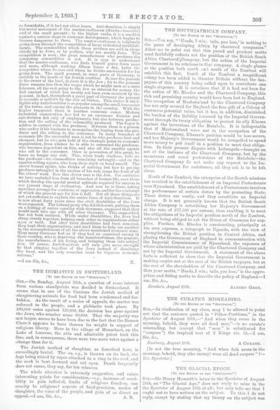THE SOUTHIAFRICAN COMPANY.
[TO THE EDITOR OF THE " SPECTATOR.')
SIR,—You say, "'Heads, I win; tails, you lose,' is nothing to the game of developing Africa by chartered companies." Allow me to point out that this proud and prudent motto most faithfully reflects not the position of the British South Africa Charteredrompany, but the action of the Imperial Government in its relations to that company. A single glance at the position both north cu I south of the Zambesi will establish this fact. South of the Zambesi a magnificent colony has been added to Greater Britain without the tax- payers of this country being called upon to contribute one single sixpence. It is notorious that if it had not been for the action of Mr. Rhodes and the Chartered Company, this rich and promising country would have been lost to England. The occupation of Mashonaland by the Chartered Company has not only secured for England the free gift of a Colony of enormous potential value, but it has, in addition, diminished the burden of the liability incurred by the Imperial Govern- tnent through its treaty obligation to protect its ally Khama against the incursions of the Matabele. It is indisputable that if Mashonalaud were not in the occupation of the Chartered Company, Rheum's position would be less secure, and her Majesty's Government would be compelled to spend more money to put itself in a position to meet that obliga- tion. In their present dispute with Lobengula—brought on not at the instance of the Chartered Company, but by the monstrous and cruel pretensions of the Matabele—the Chartered Company do not make any request to the Im- perial Government for assistance; all they ask is to be left alone.
North of the Zambesi, the enterprise of the Scotch missions has resulted in the establishment of an Imperial Protectorate over Nyasaland. The establishment of a Protectorate involves the performance of certain duties by the protecting State. These duties are costly, and they constitute an Imperial charge. It is not generally known that the British South Africa Company is subsidising her Majesty's Government at the rate of £17,500 per annum, thus enabling it to meet the obligations of its Imperial position north of the Zambesi, without being obliged to ask the House of Commons for sup- plies. Further, Mr. Rhodes is constructing, principally at his own expense, a telegraph to Uganda, with the view of strengthening the British position in Central Africa, and placing the Government of England in communication with the Imperial Commissioner of Nyasaland, the expenses of whose administration are paid by the Chartered Company and not by the Imperial Government-. A statement of the above facts is sufficient to show that the Imperial Government is making empire not at the cost of the British taxpayer, but at the cost of the shareholders of the Chartered. Company, and thus your motto, "Heads, I win; tails, you lose," is the appro- priate and fitting motto to describe the policy of England.—I am, Sir, &c.,


































 Previous page
Previous page